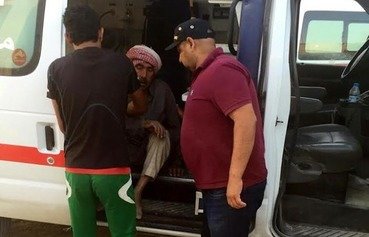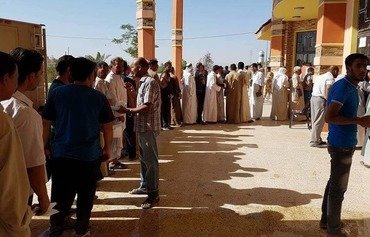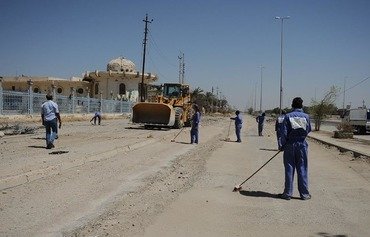Since the "Islamic State of Iraq and the Levant" (ISIL) was ousted from Fallujah in June, the streets have been cleared of the explosive remnants of war and around 19,000 displaced families have returned to their homes, officials tell Diyaruna.
To facilitate their return, two entry points were opened at the eastern and western side of the Anbar province city, Fallujah mayor Issa al-Sayer said.
Families have been pouring back into the city through al-Suqour checkpoint in the eastern part of the city and via al-Salam Junction across the new al-Jumhuriya Bridge in the west.
Displaced families were allowed to return to their homes after explosive devices planted by ISIL fighters as the group fled the city were deactivated and booby-trapped houses were cleared, al-Sayer said.
![A street vendor sells fruit and vegetables in Fallujah after it was liberated from the 'Islamic State of Iraq and the Levant'. [Saif Ahmed/Diyaruna]](/cnmi_di/images/2016/12/01/6684-Iraq-fallujah-market-600_384.jpg)
A street vendor sells fruit and vegetables in Fallujah after it was liberated from the 'Islamic State of Iraq and the Levant'. [Saif Ahmed/Diyaruna]
Public services such as water and access to the national electric grid have been restored in a number of neighbourhoods, he told Diyaruna, and privately-owned generators are up and running.
"Local families were overcome with joy as they returned to their homes after being forced into displacement for three years," al-Sayer said.
These were "difficult years" for those who had been forced away from their hometown and homes as a result of terrorism, he said.
The security forces and government committees overseeing the return of internally displaced persons (IDPs) through the two main entryways have access to computer databases to verify documents and IDs, he said.
They also have the authority to arrest wanted individuals, he added.
Dark days under ISIL
When ISIL was in control of the city, its elements "posed a threat to civilians and prevented them from living peacefully", said Usama Ali al-Jumaili, a 41-year-old resident of al-Shurta in central Fallujah.
The group imposed draconian punishments such as amputating the hands of smokers, stoning people for drinking alcohol and flogging men who did not grow beards or wear traditional Islamic clothing, he told Diyaruna.
"As we returned to Fallujah, we were overjoyed to come back to our homes after two and a half years of internal displacement," al-Jumaili said.
"Iraqi forces, which included army, emergency units and tribal forces, played an honourable role and welcomed us with open arms," he said. "They gave us food and water during our stay at the IDP receiving centre at al-Suqour checkpoint until we were issued special badges that would allow us to enter the city."
"While ISIL was in control, everything was dark," he said. "We do not want terrorism to ever come back to our homes in Fallujah."
To ensure the future safety of the city and province, "all Anbar residents should work with the security forces to defeat the remaining ISIL cells in the western areas of the province and report any suspicious activities", al-Jumaili said.
Happy in spite of damage
Fallujah is a "city of peace whose soil the terrorists tried to contaminate, but it was cleansed and liberated from the gangs of ISIL", said Diana Owaid al-Mohammedi, a 38-year-old resident of the city's al-Moallemeen neighbourhood.
"Now we are able to enter Fallujah and our home. We are happy in spite of the damage done to the city," she told Diyaruna.
While it was in control, ISIL prevented women from mixing with men at work and in the market and imposed a strict dress code of a black veil, niqab and gloves, al-Mohammedi said.
"This was even mandatory for young girls and children," she said, adding that fear of ISIL has now subsided and normal life has resumed.
"Government agencies and security forces gave us food and humanitarian assistance as we entered Fallujah," al-Mohammedi said. "They also made drinking water available to us from the water plants and provided electricity from generators."
"But we also want other services such as electricity from the national grid, and we hope for reconstruction efforts to restore everything that ISIL has damaged," she added.
Difficult, bitter years in exile
"The three years that we spent in Baghdad were difficult and bitter," al-Jumhuriya neighbourhood resident Jassim Abdullah al-Shimmari, 49, told Diyaruna.
"We were overcome with joy upon our return to Fallujah, although my house was burned down by the terrorist group because my son is an officer in the Iraqi army," he said.
"We will, however, continue to work and carry on, and we will rebuild our house and stand in the face of wretched terrorism as we support our forces," he said.
All the people of Anbar -- and particularly Fallujah -- have been hurt by ISIL, al-Shimmari said, adding that the group committed massacres against innocent civilians.
Atrocities committed by ISIL included beheadings, flogging young people and stoning women under flimsy pretexts, such as smoking cigarettes or shisha, listening to music or using mobile phones, he said.
"But now we can move freely in Fallujah without fear or hesitation, and we rejoice in seeing friends, family and relatives," he added.
The sound of bombs and missiles and ISIL attacks in Fallujah forced Shihab Mohammed al-Ani, 39, to flee and leave his home for more than two and a half years "under circumstances that can be described difficult at best", he told Diyaruna.
"We fled to Kirkuk, and today we are able to safely and peacefully return to our city," he said.
Many people have returned to their jobs, including public sector employees, truck and taxi drivers and construction workers, and shops have reopened their doors without fear of ISIL, al-Ani said.
Fallujah is full of its people once again, he said.

![Students in Fallujah have resumed classes since the Anbar city was liberated from the 'Islamic State of Iraq and the Levant'. [Saif Ahmed/Diyaruna]](/cnmi_di/images/2016/12/01/6683-Iraq-fallujah-students-600_384.jpg)






